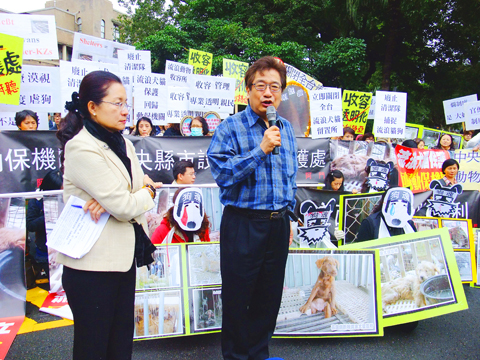Legislators and activists yesterday unveiled a proposal to create an Animal Protection Bureau under the Council of Agriculture (COA).
The drafters of the proposal — which has been signed by 20 legislators — said the bureau would consolidate the efforts of different government agencies and address concerns expressed by animal rights activists about temporary animal shelters.
Speaking to dozens of activists led by Chen Yu-min (陳玉敏) of the Environment & Animal Society of Taiwan (EAST) outside the Executive Yuan, Chinese Nationalist Party (KMT) Legislator Lee Ching-Hua (李慶華) said: “We must work together to immediately stop this kind of atrocious behavior.”

PHOTO: CNA
Lee was referring to allegations of abuse of stray animals at animal shelters.
Chen said Lee agreed to draft the proposal after being shown a documentary filmed by her group last month.
The documentary showed cats and dogs being denied water, food and basic healthcare at animal shelters.
The group said temporary shelters that are not subject to regulation by local authorities and fall into a gray area not clearly defined under the Animal Protection Law (動物保護法) are becoming more common as permanent shelters become overfull.
They called for authorities to close all temporary animal shelters and expand and improve permanent ones.
The group said its conclusions were based on evidence gathered during a three-year nationwide investigation of such facilities.
Democratic Progressive Party Legislator Tien Chiu-chin (田秋堇) likened the shelters to “concentration camps.”
In reference to the 17 local governments that use cleaning teams to catch stray animals, she said “it is wrong to treat our beloved pets as waste.”
EAST estimates that 900,000 stray pets have been picked up by local authorities in the past 10 years. Around 133,000 were picked up last year alone, of which 96,400 were killed.
The proposal said that by consolidating efforts and raising their status, Taiwan can ensure that its animal welfare does not lag behind other industrialized countries.
The duties of the proposed bureau would include managing the pet and pet food industries and implementing animal protection policies.
The legislators did not comment on when the proposal could become law.
Minister without Portfolio Liang Chi-yuan (梁啟源) said that in the meantime “the government will work fast to make changes to the system.”
He said the government would prioritize the matter and work with local animal control authorities to improve permanent shelters and close temporary ones.
He said the central government would sit down with city mayors and county commissioners after next month’s local elections to discuss tackling the problem.

A preclearance service to facilitate entry for people traveling to select airports in Japan would be available from Thursday next week to Feb. 25 at Taiwan Taoyuan International Airport, Taoyuan International Airport Corp (TIAC) said on Tuesday. The service was first made available to Taiwanese travelers throughout the winter vacation of 2024 and during the Lunar New Year holiday. In addition to flights to the Japanese cities of Hakodate, Asahikawa, Akita, Sendai, Niigata, Okayama, Takamatsu, Kumamoto and Kagoshima, the service would be available to travelers to Kobe and Oita. The service can be accessed by passengers of 15 flight routes operated by

GIVE AND TAKE: Blood demand continues to rise each year, while fewer young donors are available due to the nation’s falling birthrate, a doctor said Blood donors can redeem points earned from donations to obtain limited edition Formosan black bear travel mugs, the Kaohsiung Blood Center said yesterday, as it announced a goal of stocking 20,000 units of blood prior to the Lunar New Year. The last month of the lunar year is National Blood Donation Month, when local centers seek to stockpile blood for use during the Lunar New Year holiday. The blood demand in southern Taiwan — including Tainan and Kaohsiung, as well as Chiayi, Pingtung, Penghu and Taitung counties — is about 2,000 units per day, the center said. The donation campaign aims to boost

ENHANCING EFFICIENCY: The apron can accommodate 16 airplanes overnight at Taoyuan airport while work on the third runway continues, the transport minister said A new temporary overnight parking apron at Taiwan Taoyuan International Airport is to start operating on Friday next week to boost operational efficiency while the third runway is being constructed, the Ministry of Transportation and Communications said yesterday. The apron — one of the crucial projects in the construction of the third runway — can accommodate 16 aircraft overnight at the nation’s largest international airport, Minister of Transportation and Communications Chen Shih-kai (陳世凱) told reporters while inspecting the new facility yesterday morning. Aside from providing the airport operator with greater flexibility in aircraft parking during the third runway construction,

American climber Alex Honnold is to attempt a free climb of Taipei 101 today at 9am, with traffic closures around the skyscraper. To accommodate the climb attempt and filming, the Taipei Department of Transportation said traffic controls would be enforced around the Taipei 101 area. If weather conditions delay the climb, the restrictions would be pushed back to tomorrow. Traffic controls would be in place today from 7am to 11am around the Taipei 101 area, the department said. Songzhi Road would be fully closed in both directions between Songlian Road and Xinyi Road Sec 5, it said, adding that bidirectional traffic controls would